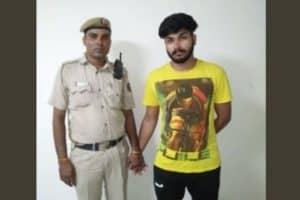There is a case for fast-track courts for crimes against women, in order to break the culture of misogyny and patriarchy’s tolerance of violence against women
If we were to learn anything from the iconic Indian film Pink, released in 2016, it would be that those with unlimited power also have the means to exploit that power. The film was a courtroom drama directed by Aniruddha Roy Chowdhury, tracing the trial of a man who allegedly molested a girl at a concert. The power play and dynamics between the criminal relative of a politician and a young everyday girl is magnified in the courtroom.
Men in power have historically tended to abuse that power to assert their control over the women around them, by a number of means. The most recent shocking case was that of ASI Ashok Kumar’s son Rohit Tomar relentlessly beating a girl at a BPO owned by his friend, who also filmed the video. It was later discovered that he used the video to coerce his ex-girlfriend to go out with him. His threat was that, should she refuse to spend time with him, he would hurt her the same way he hurt the girl in the video.
Whether it is the sheer confidence of never facing any consequences or the assurance of the ever-present silver spoon in their lives, this is not the first time the son of a man in power has used it to abuse a girl. And had the audacity to ask someone to videograph it.
In August this year, P Bhatia was witness to a Physical Training Instructor of Jain Boys Senior Secondary School brutally caning two women on the streets. He was able to record and send it in to NGOs hoping they would take some action. The instructor, S Rathi, is seen beating these women with a stick while they scream in pain, asking him to stop. This went virtually unreported by mainstream media.

It’s not as if powerful men are modifying their approach to women even 18 years after the advent of the 21st century. Back in 1996, it was Santosh Kumar Singh, son of a police inspector general, who raped and murdered Priyadarshini Mattoo in her own house. He had been obsessively stalking the 25-year-old law student for a long time. Almost 10 years following the girl’s tragic death, the man was found guilty.
A similar case was the murder of Jessica Lall by Manu Sharma, son of former Indian National Congress president Venod Sharma. He had reportedly shot the model in the head when she refused a drink at a bar. Since the incident, Sharma has been in jail for 15 years. Reports have suggested that Sharma has been availing an open jail system at a hotel owned by his father, and the jail warden’s son has been given employment as a manager at one of Venod Sharma’s companies.
When Sabrina Lall, the sister of the deceased, recently went on record to say that she had forgiven Sharma, believing that he had reformed, observors were skeptical. They believed that she had done so because of being intimidated. She called it “a load off her family’s chest,” and stressed that owing to all the social work Sharma did during his time behind bars, she believed that he has paid his price.
According to advocate Jeetender Gupta, “I do not think it is authentic. There are always social pressures, and an inherent loss of hope in the legal system. Threats and bribes are regularly made to complainants to withdraw their cases.” He goes on to explain that many of these criminals try to keep the case from going to trial by trying to extend the bail period for as long as possible, since they cannot be convicted until the end of their bail, and until then they are virtually free.
He is of the opinion that the perpetrators take advantage of the poor conviction rate and loopholes in the law when it comes to these crimes. “The perpetrators hardly ever have to face the music, unless the abuse is of a particularly heinous nature. Like in the Nirbhaya case, the entire nation was up in arms. But unfortunately, when it comes to a beating like in the recent viral video, it automatically falls lower on the priority list.”
Prabhloch Singh, businessman and social worker, and owner of Human Rights Protection Group and MFP Federation, formerly known as the Middle Finger Protests (one of the foremost units protesting against the Jessica Lall murder) weighs in on the issue. “Most perpetrators think they’ll get away with it thanks to the power they enjoy coupled with insensitive and corrupt cops and overburdened judiciary. There should be zero tolerance for cops indulging in laxity or showing insensitive approach towards victims of such crimes.” As a highly involved activist himself, he also says that people like him are also constantly on the receiving end of death threats from “the powers that be.”
A terrifying and more recent case was the gangrape of a policewoman inside an all-women police station in Haryana.
Rural police stations too are often the sites for crimes against women, so confident are these men in their superior power over the opposite sex. In the Haryana case, the victim is 32 years old and is a head constable. She was raped by two men at knife point. This case is under investigation.
The general ever-present problem of patriarchy, alongside the long but often slow arm of the law have made it consistently easy for these abusers to get away with their crimes, and it is also what encourages them to commit more such crimes. According to Prabhloch Singh, over the years India has built a culture of acceptability towards crimes against women.
“The solution, as I see it,” says Gupta, “is to create fast track courts for crimes against women, and make the trial time shorter. If the conviction rate rises, there is still hope that these crimes too will decrease.”





